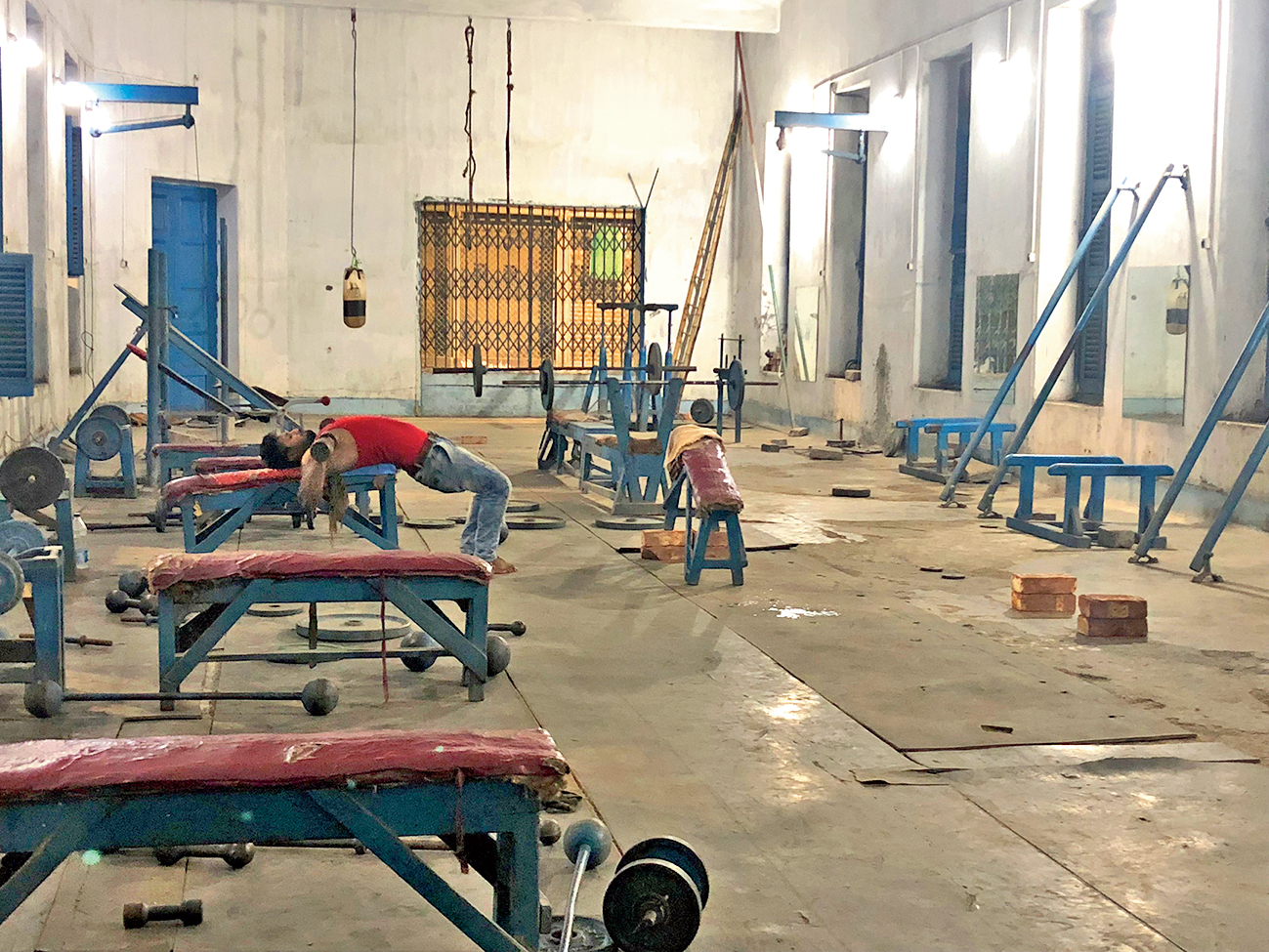The plaque outside the white-and-blue building in central Calcutta’s Mohammad Ali Park reads — Jitendra Byayam Mandir. Byayam is Bengali for physical exercise. “This place is named after its founder, Captain Jitendra Nath Banerjea,” says Mohammad Asgar who is secretary of the All Bengal Physical Culture Association, the organisation in charge of the old-world gym.
We gather that so far as this place is concerned, Asgar is a key figure. Everyone around here refers to him as Sanu Bhai. Looking rather chuffed he tells us, “Captain was one of the bodyguards of Queen Victoria.” We are all ears, we want to know more, but he cannot tell us any more about the man. He cannot refer us to anyone who knows the specifics either. After a while we give up.
He continues with his narrative though. The gist of it is this. Captain Banerjea’s primary intent was to build a place where young people, students especially, could work on their physical fitness while developing their intellectual prowess. Says Asgar, “There was no concept of a gym in the 1930s, which is when this place was built. This room would only have a flickering candle when people exercised.” And how does he know this? From his seniors and their seniors. He has been a member of this quaint institution for 25 years now. When he had joined, the monthly fee was Rs 2; it is Rs 100 now.
The longish hall is not all that well lit even now. There is only one fan, that too in the farthest corner. “You don’t need them,” Asgar tells us. “When we open all the windows, it is quite airy. Besides, the main purpose is to exercise.” In the white light, the place with its ancient equipment and spartan furniture seems to be something out of an old film or a book. There are stark wooden benches to rest on, loops for gymnastics, pulleys, bricks for push-ups, dumbbells — the old fashioned kind.
One man, a Vinod Shaw from Sealdah, is doing sit-ups. “A friend who stays near Bari Masjid recommended this place. It doesn’t charge much and we get proper training too,” he says, walking towards the bench press. “Captain Banerjea had these made,” says Asgar pointing to a pair of iron plates for the bench press. Indeed, etched on the outer rim of the plate in English is the following — “ABPCA, Capt J N Banerjea”. There are 11 full-length mirrors for posture, to maintain balance and for self-motivation, we are told.
A narrow flight of stairs leads to the first floor, which has an office that is mostly shut and an area that can be best described as a longish gallery. The gallery overlooks the hall on the ground floor, but its larger purpose in the Captain’s scheme of things was to serve as an indoor running track.
In one corner, there is a wooden rack with a neat heap of sports shoes of different sizes. “For those members [there are 80 in all] who cannot afford their own,” says Asgar. He tells us that those who have been members for decades are usually exempt. Impoverished students are taken in free of charge as well. “After all, this is better than any other kind of addiction,” says Asgar. We learn from him that the place used to be frequented by Monotosh Roy, the first Asian to be awarded the Mr Universe title in 1951.
As we walk out of Byayam Mandir, Asgar stops and points to a black-and-white photograph high up on the wall, above the door. “Meet Captain Banerjea,” he says with a flourish. We look up and see an elderly man, bare-bodied, muscular, wearing a dhoti hitched up to his knees, staring down at us. He is sitting ramrod straight, hands on knees and his expression is difficult to read.
Below, 17-year-old Rohit Singh is doing push-ups. He has two bricks under each palm. We stop to talk to him after we have taken leave of Asgar. Turns out that the Class XII student joined the gym recently. We ask him, if he knows about the man who founded the place, Captain Banerjea, the Queen’s bodyguard.
He replies, “Unse maine zyada baat nahi ki. Woh wahin baithte hai na,” and points solemnly to the desk where Asgar sits.











